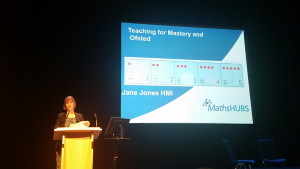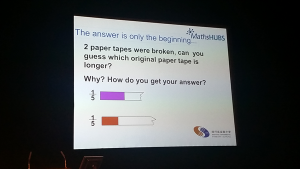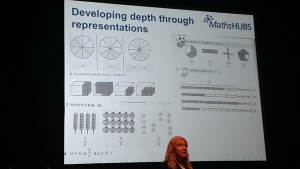Ofsted and mastery of maths – direct from Jane Jones HMI

I had the opportunity to listen to Jane Jones HMI speak at the Maths Hubs Primary Conference today and did my best to capture what Jane was saying. You’ll see from the notes below, how positive Ofsted are about a mastery approach to maths.
It’s important to mention that Jane has reviewed and okayed these notes.
********************* NOTES BEGIN **************************
You might not expect to see ‘synergy’, ‘Ofsted’ and ‘mastery’ in the same sentence but that is how we see it.
Ofsted believe there needs to be a marriage of knowing the basic facts with deeper understanding (not pursuing either in the absence of the other.)
Under the previous curriculum, pupils have tended to very quickly be put on to a particular track. If they are ‘rapid graspers’ (rather than ‘high attainers’) they go a higher/faster track but if they’re not, they go on to a lower/slower track. In both cases that’s where they stay.
Instead Ofsted are of the belief that all pupils should achieve including and especially pupils from disadvantaged backgrounds. A mastery of maths approach is a vehicle for catching pupils up and keeping them caught up.

On inspections
When watching a mastery lesson, and Jane’s inspectors know this, whole class teaching could look slower than usual. What’s important is that learning is deeper.
“Deepening understanding” is in the Ofsted handbook, not “accelerating teaching”.
On the matter of the Ofsted handbook, paragraph 55 is a good place to look as it is on inspecting maths.
Things inspectors are looking forward to considering how well:
- Pupils are thinking and reasoning.
- Pupils are applying skills fluently and efficiently, arriving at accurate answers.
- Pupils are using resources to aid their understanding.
There is nothing in the Ofsted handbook that conflicts with the principles of mastery of maths.

- What the school is trying to do to take maths forward from where they were/are to a mastery of maths approach.
- What an inspector might typically see in the lessons.
- What you are doing to address interventions quickly so that pupils can keep up and what you are doing to stretch the rapid graspers.
- How far you have got in developing systems to help you track attainment and progress in maths – focusing on the most important things ready for the next stage/year/term.
Jane concluded her talk with a call for everyone in the room to “Go for it! Do the right thing for your pupils!”
********************* NOTES END **************************
It seems Ofsted are taking great strides to ensure there is internal consistency amongst the inspectors, who are currently having to reapply to keep their jobs in September. As part of the re-recruitment process, inspectors must receive training on the mastery approach and certainly one HMI who I met this week was telling me, with convincing conviction, about what he was hoping to see in maths lessons with regards to ‘section 55’.
So pleased to read this again. Unfortunately, I couldn’t attend yesterday as we had a mock inspection. Before the inspection, they had expressed an interest in the Singapore textbook project that I am taking part in. The head asked me to prepare a brief summary to explain the approach. I included suggestions to read the blogs by Charlie Stripp (?) and Jane Jones on the NCETM website.
After a colleagues (literacy) lesson was observed the day before I had heard that they were concerned that there was not enough differentiation of learning objectives.
I was ready to argue our approach and willing them to come and see my maths lesson yesterday where they would not see wide differentiation of learning objectives. The lesson went well, children working as a whole class exploring the relationship between addition and subtraction through the model of number bonds. We had CPA and great reasoning going on.
I was also influenced by the shanghai teacher I had observed teaching y1 on Monday.
Unfortunately, they didn’t come in.
What I heard at the end of the day though was that although our data is fantastic and our books too, we needed to show more differentiation in lessons and to move children on when they have ‘got it’.
What a shame! I don’t think they had time to read Jane Jones’ article. I just hope my head does and that when the real OfSTED come, they have too.
Thanks Helen for sharing this story. A shame you didn’t get observed (not often people express regret at that!) It will take a while for the message to propagate to Mocksted inspectors I guess. Meanwhile, yes, let’s hope your head is up to speed.
What you write here Bruno is wholly consistent with conversations I have had with Jane in the past few years and sits exactly with two Ofsted Mathematics publications: “Understanding the score” (2008) and “Made to measure” (2012).
The move away from acceleration towards depth and away from ability grouping are fundamental pedagogic structures which I hope SLT’s will give support to in their schools.
Thanks for putting this piece together – perhaps it could be the basis for an article for Mathematics Teaching?
Regards
Mike